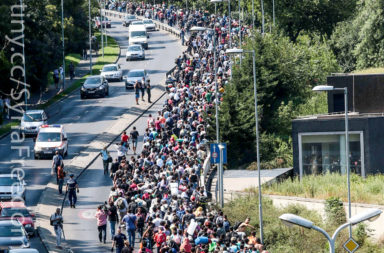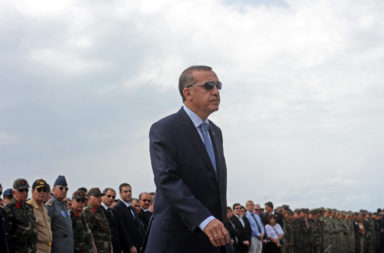While Donald Trump makes headlines around the world, Turkish President Recep Tayyip Erdogan is slowly rolling back the clock in Turkey. He seeks to pass constitutional reforms that would hand him far greater powers than have been afforded to any Turkish leader in modern times. In his pursuit of this increasingly autocratic role he has imprisoned a German journalist in Istanbul, and has sought to campaign on foreign soil. Now the German public has taken a stand.
- Erdogan’s purge continues
- Campaigns in Austria and Germany banned
- Merkel and Erdogan at loggerheads
The deluge of affronts to democracy related to Erdogan’s purge has slowed to a steady stream. More than 100,000 people have been sacked or suspended from Turkey’s police, military, civil service and private sector since the last year’s failed coup and tens of thousands have been arrested.
The aftermath of the failed coup in July last year is still taking its toll on the freedoms of those in the nation and now the purge is affecting citizens of other nations. On February 14th authorities detained Deniz Yücel on charges of propaganda in support of a terrorist organisation and inciting the public to violence.
The Die Welt correspondent reported on emails that a leftist hacker group had allegedly obtained from the private account of Berat Albayrak, Turkey’s energy minister and the son-in-law of Turkey’s president Recep Tayyip Erdoğan. He has been jailed pending trial.
Erdogan’s campaigns stretch far from Turkey
In his attempts to gain more powers, Erdogan has called a referendum on the constitution in April. While at home he has been silencing critics, abroad he is attempting to secure the vote of the symbolically important Turkish diaspora. These efforts have been met with stern opposition in some EU countries.
Authorities took the decision to withdraw permission for an event to take place on Thursday in the southwestern German town of Gaggenau. Turkey’s Justice Minister Bekir Bozdag had intended to meet with Turkish voters living in Germany to rally support for the constitutional reforms. In a shocking development, there was a bomb threat on the town a day later.
The minister subsequently pulled out of a meeting with his German counterpart, Heiko Mass. “It is unacceptable that the German authorities are not tolerating a meeting of the Turkish community, while they are always lecturing everyone on human rights, democracy, rule of law and freedom of expression,” Bozdag told reporters in Strasbourg, France.
Meanwhile, in neighbouring Austria, authorities took a similar view of Erdogan’s proposed campaigning. The Austrian Foreign Minister Sebastian Kurz said Erdogan is “not welcome” to hold events in the country: “we clearly reject the Turkish campaign and (the resulting) polarisation to Austria.”
“We do not accept those irresponsible comments that exceed their limits and the distorted mentality,” Turkish foreign ministry spokesman Huseyin Muftuoglu said in a statement late on Monday.
Merkel in a sticky position
As a result of the imprisonment of Yücel, there have been calls to ban Erdogan from visiting Germany. Stephan Mayer, of Bavaria’s CSU party, said a Turkish president who imprisoned German journalists was “not welcome as a guest in Germany”.
A spokesperson for Merkel rejected the suggestion of any ban however. Steffen Seibert said:
“The German government deplores the fact that freedom of speech and freedom of the press are currently limited in Turkey to an unacceptable degree.
“If we deplore this in another country, then we should be even more alert to make sure that freedom of speech is respected, within the framework of the law, in our own country. We should demonstrate what we demand from others.”
This assertion, while also respecting freedom of expression, may be due to Germany’s complex relationship with Turkey and its vital role in controlling the flow of migrants into Europe.
Yücel’s arrest also comes at a difficult time for Merkel, with only seven months until the election, which is expected to be extremely tightly contested. Erdogan has used the refugees as a bargaining chip before and there is no reason to believe he won’t do it again.
Merkel’s ability to hold off the rise of the far-right AfD party is heavily dependent on her apparent control of the migrant situation. As deplorable as Erdogan’s continuing purge is, the importance of Merkel’s re-election to a stable Europe designates it a necessary evil for the time being.





